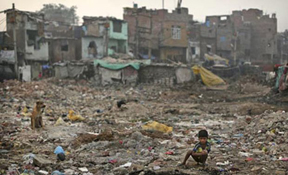 UNITED NATIONS: India has the highest number of people practicing open defecation in the world at 597 million, according to the UN which said political will at the “highest level” is needed to address the challenge.
UNITED NATIONS: India has the highest number of people practicing open defecation in the world at 597 million, according to the UN which said political will at the “highest level” is needed to address the challenge.
Noting Prime Minister Narendra Modi’s pledge to end the practice in the country by 2019, the UN said it is an “ambition” channeling the view of Mahatma Gandhi, who had termed sanitation “more important than independence.”
About one billion people worldwide or one-sixth of the developing world’s 5.9 billion population do not use toilets.
About 825 million people – 82 per cent of the one billion practicing open defecation reside in just 10 countries, the UN said as it marked ‘World Toilet Day’ today.
India has the highest number of people practicing open defecation at 597 million or 47 per cent of the national population. Others are Indonesia (54 million), Pakistan (41 million, Nepal (11 million) and China (10 million).
The other five countries where people do not use the toilets are in Africa, namely Nigeria, Ethiopia, Sudan, Niger and Mozambique.
UN also called on religious, education and opinion leaders in developing regions to join government officials and champion a halt to open defecation, highlighting the health threat posed by lack of access to sanitation, and the particular dangers open defecation poses for women and girls.
“We know that political will at the highest level is critical to address these challenges. However, we also know that success at ending open defecation goes beyond infrastructure. It requires the understanding of behaviors, cultural attitudes and social norms,” Deputy Secretary-General Jan Eliasson said in a statement.
The UN noted Modi’s pledge to have 111 million toilets and achieve an end to open defecation by 2019, saying it is an “ambition” channeling the view of Mahatma Gandhi, who had termed sanitation “more important than independence.”
Eliasson added that women and girls bear the “greatest burdens” caused by the lack of toilet access.
“Girls are more likely to drop out of school if they don’t have access to a safe and clean toilet. Women and girls are also at the risk of harassment and sexual abuse when trying to use public toilets or when trying to find somewhere to defecate in the open,” he said.
“Universal access to sanitation has a clear role to play in defending women’s safety, dignity and equality,” he added.
PTI YAS
Chris Williams, Executive Director of the Water Supply and Sanitation Collaborative Council, a global membership organization hosted by the UN, said the active support and efforts of leaders of religion, education and public opinion are needed as much as that of elected and other government officials.
“We call on all leaders of societies and cultures where open defecation habits are still tolerated: Help us end the taboos associated with frank talk about the dangers of the practice and the benefits of proper sanitation and hygiene,” he said.
UNICEF said the call to end the practice of open defecation is being made with growing insistence as the links with childhood stunting become clearer.
India also has high levels of stunting. UNICEF had convened a conference in New Delhi called ‘Stop Stunting’ to call attention to the effect of open defecation on the entire population, particularly children.
UNICEF’s ‘Take Poo to the Loo’ campaign in India also works to raise awareness of the dangers associated with open defecation.
Coinciding with the marking of World Toilet Day, the Toilet Board Coalition was launched which is a global, business-led coalition of leading companies, government agencies, sanitation experts and non-profit organizations.
It aims to develop sustainable and scalable commercial solutions in response to the sanitation crisis.
Among the initiatives started by the coalition is engaging a co-creation process with four leading rural sanitation implementation agencies to design and test commercially sustainable solutions for villages in India, Bangladesh and Cambodia.
The UN said that the practice of open defecation is deeply rooted in poverty but has also been related to convention and customs in some countries and societies.
In sub-Saharan Africa, where 25 per cent of the population practices open defecation, diarrhea is the third biggest killer of children under five years old.
The recent Ebola outbreak also shone a public spotlight on the open defecation issue in West Africa where worried health officials in Lagos and Nigeria, citing human waste as a vector of the virus, appealed through the media for citizens practicing open defecation to stop.
Open defecation is declining steadily in Asia, and in Latin America and the Caribbean.
In South Asia the percentage dropped from 65 per cent in 1990 to 38 per cent in 2012, with the greatest reductions in that region recorded in Nepal (from 86 per cent in 1990 to 40 per cent in 2012), Bangladesh (from 34 per cent to 3 per cent) and Pakistan (from 52 per cent to 23 per cent).
Governments that have invested in behavior change programs, rather than just in constructing of toilets have seen the most positive results, the UN said.–PTI





